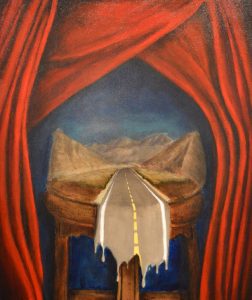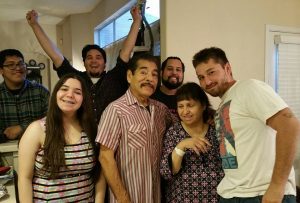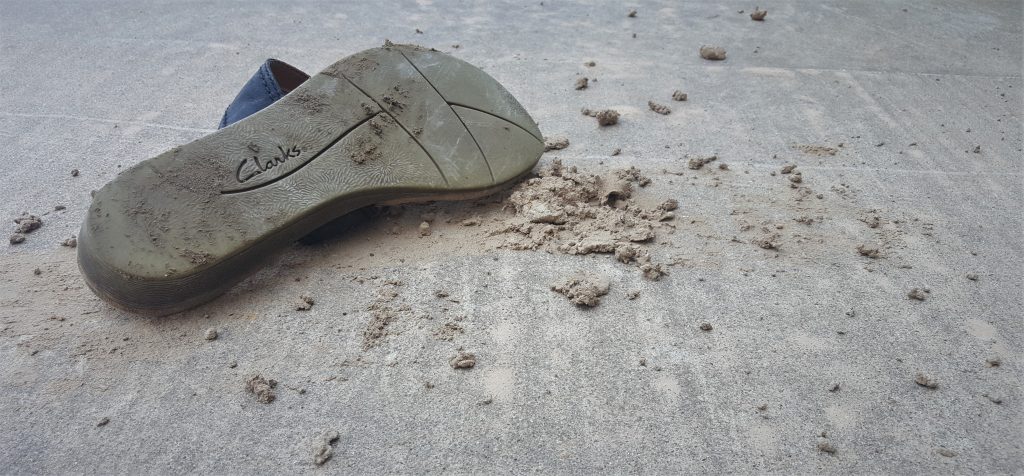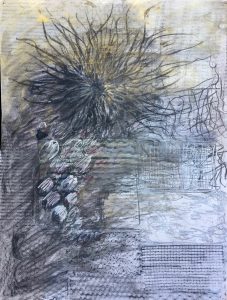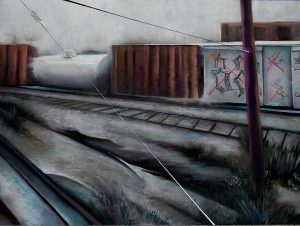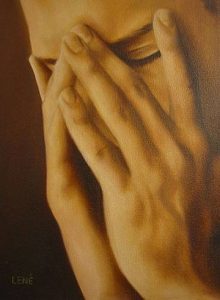
Alone by: Linda Gee, Transfer, pen and ink on paper, 2016.
Best Friends
by: Crystal Alford
“Ah shit, man, be careful with that.” I shook out my arm as the ice cold wind sent pricks down my now all too sensitive skin. Roger had been throwing a stick for some stupid stray and caught me square in the elbow; to top it off, now the mutt would not stop following us.
“Sorry man, you got in the way.” I looked on in disgust as he bent to rub the dog’s belly, seemingly unconcerned about its pus-filled scars or its flea infestation.
Roger simply shook his head at me. “I swear you hate anything with life beating through its veins. I think that’s why you love winter so much, everything is dead.”
“That’s not true. You’re fine,” I mocked as I lit up a cigarette. “Leave that thing alone, you’ll make it follow us to the cave and that mutt will want to stay there day in and day out.”
Roger did as I asked, shooing the pup away, and with some semblance of luck it hadn’t followed us to the caves. This has been our escape from the world for as long as I can remember, our fortress of solitude. We come here every day after school to escape life. Life at home for Roger is pretty much fine; well, as fine as things get in this town. His stepdad is still a drunk and his mother has never been good at hiding her dirty little secrets, but he does have a roof over his head and more often than not hot meals on his plate. I, however, am lucky to get a pity pack of cigarettes from Mike who owns the corner shop down by the lake.
“You know I could keep him, maybe name him Spike or something.” Roger was tapping that damn stick on the cave’s wall.
I couldn’t help my eyes rolling at his absurd remark. “Are you seriously still thinking about that mutt? Where would you keep it? Mark would go crazy if you brought a dog home.”
He looked out into the thick forest of pines; I knew he was secretly hoping the pup would emerge from its depths. “I could hide it.”
That one got a good chuckle out of me. “Please, Mark knows what goes on in every corner of that house. He may be a drunk, but he’s not stupid.”
Roger slowly stood looking out at the hills. The temperature was steadily dropping and you could see it in the way his red cheeks flamed across his face, his every breath recognized by the heat that escaped his blue lips and mixed with the chilled air. I looked down at my own hands, now numb to the touch. The only thing that sucked about winter was the limited time we could spend here, but the last thing I wanted was to build a fire and let all the hood-rats that go to our school know it exists.
“We should be getting back. I want to swing by Mike’s. I’m running low.” Roger silently agreed, dragging his stick behind him.
“You know if I don’t take him in he’s gonna die out here in the cold. I mean you sometimes help Mike out for a pack. Maybe I could help him out for a buck or two. If I pay for Spike, Mark can’t say nothin’, right?”
It was almost pathetic how hopeful his piercing blue eyes looked. “Look, man, that dog is already on the list for death. It’s not your responsibility.” Roger nodded a regretful agreement, starting off on the track back home. It took us thirty minutes to reach Mike’s. The sun was already starting to fade and night was quickly descending.
“Mike, my man!” I jumped on the counter next to the register twiddling with my last cigarette.
“No, Sam. I told you I can’t be giving you any more free shit.”
“Hey! It’s not free if I work for it.” I gave him my slyest smile hoping to dissuade his efforts of denying me. “Give me the broom and I’ll help you close the place down man.”
“You know Betty will have my head. She says you need to get yourself off the pack a day. Find a job. You’re sixteen now, you could work at the lumber yard. I hear they’re hiring.”
“The lumber yard? Damn, that will pay a pretty penny, right? I could pay for Sparky…”
“Stop with that damn dog Roger! It’s gone anyways. Lord knows if you’ll ever even see it again.” I looked over at him only to find him in the pet aisle looking at a leash. I shook my head but reverted my attention back to Mike. “Look, I can help you close, grab a pack, and then I myself will make it a point to speak with your lovely wife Betty and maybe I can begin to help out more often for the same reasonable price.”
“Sam, if you worked at the lumber yard you could actually buy food. Good lord knows your momma don’t feed you even when she is in town.”
I grunted at the blunt honesty. “Fine, if you don’t want my help I’ll apply at the lumber yard, but for the sake of all that is well in this world give me a pack before I have to hear Roger go on about a damn dog he is never gonna have.”
“Hey!” Roger began to object. I raised a hand of silence towards him not letting my gaze leave Mike. He was never good with continual rejection.
“Fine!” He pulled at his hair and threw a pack at me. “This is the last time! Boy, I swear if I lose my job because you want to become your deadbeat dad, I am going to personally kill you myself.”
“Ya…ya.” I pulled Roger by the arm leading him out the back.
“Hey! I thought you were going to help me close,” Mike yelled from the front of the store.
“I did not say what day!” I laughed at my twisted game with only a semblance of guilt at how gullible Mike was. If I didn’t make a point to at least ask Betty about the lumber yard he wouldn’t ever give me a pack again.
The stars were already filling the night’s sky, casting an eerie glow on the lake.
Home wasn’t too far from here, but I would never let Roger walk back to his house alone. I never knew if his mom was there or not, and when she wasn’t his stepdad could be a nasty son of a bitch.
“Come on, Roger, I’ll walk you to your place.” I turned to see Roger staring out at the center of the lake. “What is it man?”
“It’s Spike! Spike!” Roger shouted out waving his stick around in the air.
“That dog doesn’t know some random name you just pinned on him two hours ago.” I grabbed Roger, determined to get out of the cold. “Leave him there and let’s get moving.”
Roger yanked at his hand, taking a step out onto the lake. “No, I think he’s stuck. He’s not moving, he must be scared.”
Him and his obsession with the nasty stray were starting to fray my nerves. “Well, that dog got himself on the ice he can get himself off. It’s not thick enough for us to walk on, anyways. Leave him and he’ll find his own way back.”
“No man, we have to get him! I can’t just leave him there.”
“Roger, you don’t even know how to swim. What if the ice breaks on you? Then what?”
Roger ignored my words and continued to yell out a name that held no meaning to the dog.
The ice-chilled air was nipping at my skin, my jacket now serving no comfort. Roger seemed ill phased, his determination for the stray clearly not diminishing anytime soon, and as of now my toes were beginning to feel like phantom ants were feasting on them. “Fine. If I go get him will you please stop this nonsense?”
“If you go get him I will buy you your next pack, but I’m still gonna keep him.”
I shook my head and mumbled all the cusswords I knew to myself on my slow track to the dog. The ice was steadier than I expected for the beginning of winter. As I leaned in closer I could see what the holdup was. Sometime from us seeing him and now, Spike got a nasty slice of his leg cut up. “Come here, stupid dog. Come here, you nasty pile of fleas.” Spike let out a low growl and a bark warning me off. I guess he doesn’t like being referred to as a nasty pile of fleas. “Look, Roger wants to take care of the flea problem, but you’re on your own about the stupid part.” Two more loud barks followed by a quick snap at my hands made me take a few quick stumbled steps back. The loud cracks of ice caused by my quick movement were all too real, snapping through the air like a whip.
“Roger!” I could feel my stomach jump into my throat as I waited for time to resume. “I can’t get him and the ice is breaking.”
“Just grab him man you’re right there!”
“Bastard tried to bite me,” I objected.
“Well, quit talking mess and handle it,” he shouted back.
A giant smile played across my face at how well Roger knew me. I suppose ten years relationship would do that. I suppose it would also have you find yourself trapped on cracked ice trying to get a mutt you don’t even like just to please your best friend. I took one more step towards Spike, watching as the ice sent tiny cracks splicing out.
I took in a deep breath. “Spike, whatever you do don’t move.” I watched as his ears perked up, his tail wagging as he looked Roger’s way. Roger had taken a few steps out, shouting his name and waving that stick in the air. “No, Roger!” I shouted, but it was too late. Spike took this moment to listen to his name, darting out to meet Roger. The ice split and cracked, giving out beneath me. I cursed myself for leaving my jacket on as the weight of it filling with water pulled me further under, the ice cold depths of the lake taking all the air from my lungs. I fought all I could with my jacket, but it wouldn’t let me escape. I could hear muffled screams from the surface and see a light, but I was trapped. All I could think about was how I was going to lose my life over a damn stray infested with fleas, how God had determined that the infectious mutt had more potential to give the world than me.
I felt myself being lifted to the surface, a blanket failing at warming my skin, muffled words and bright lights. “Tired.” I think the words escaped my lips, or maybe just my mind, but I was tired in all aspects and all I wanted was to sleep. Roger shook me, urging me to stay awake. Something about a meaningless dog, but I couldn’t grasp what was being said; I had never felt sleep demand me like this before. It grabbed me with an iron fist commanding I listen, and what more could I do but listen to its warm voice that promised such sweet satisfaction?


